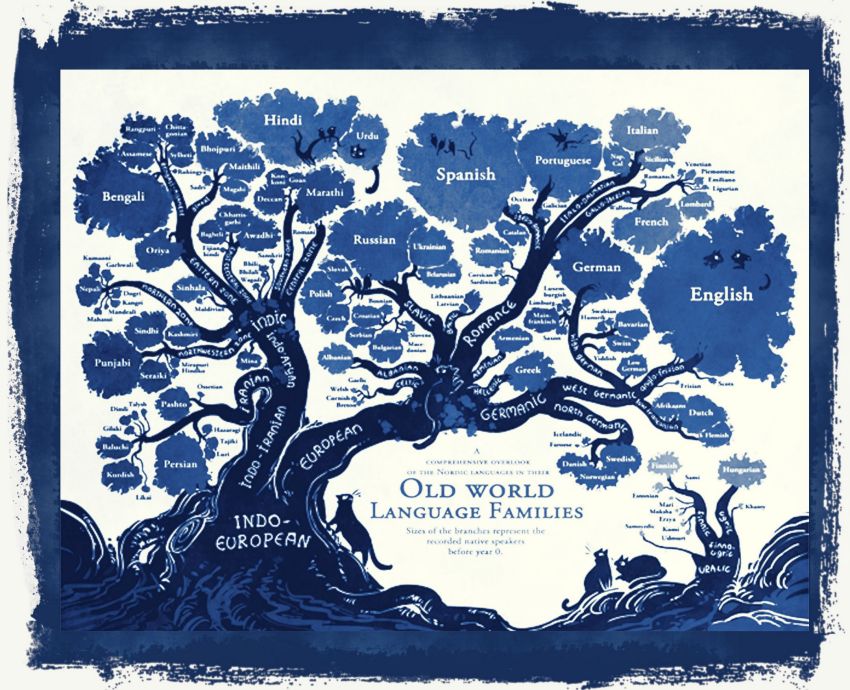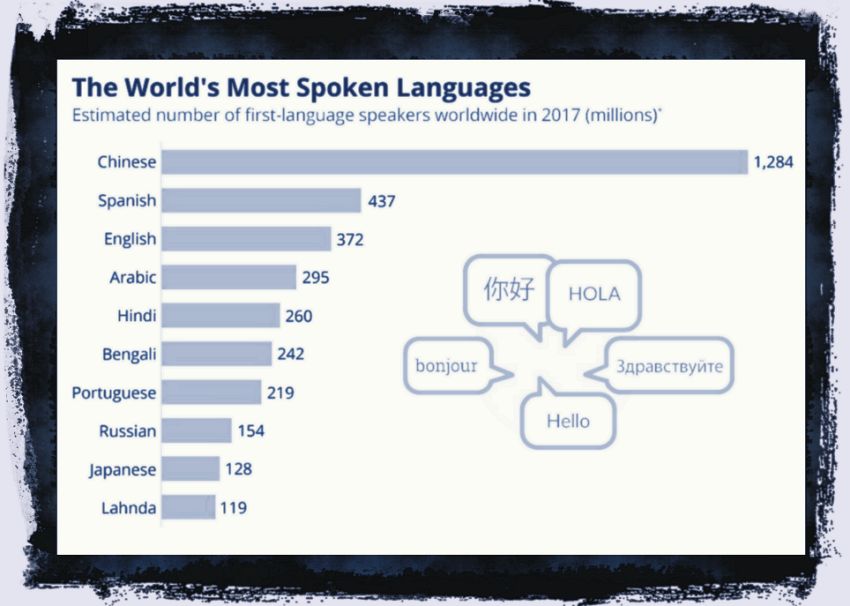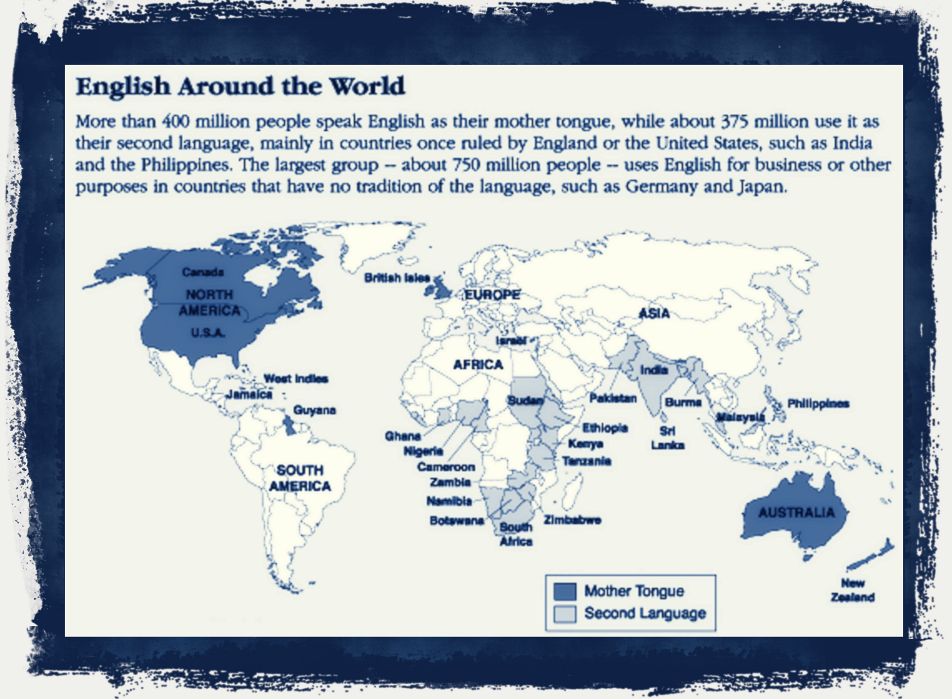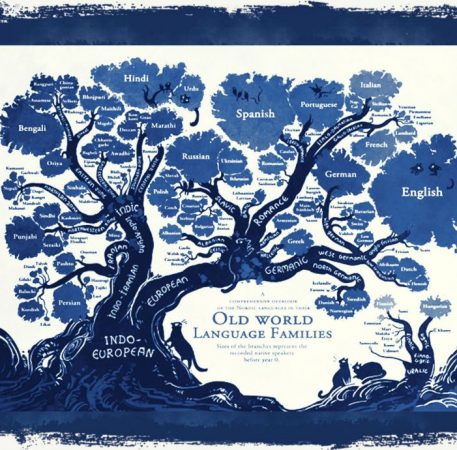
The world favourite language
Will English be the global language forever? Will English become the eternal global language or is it destined to die out sooner or later?
The best way to predict the future is to create it.
Abraham Lincoln
Learning is like rowing upstream, not to advance is to drop back.
Chinese Proverb
Language is “the infinite use of finite means.”
Wilhelm von Humboldt
Reading is to the mind what exercise is to the body.
Joseph Addison
To have another language is to possess a second soul.
Charlemagne
The English language speaking population is something like 2 billion, a third of the world’s population, and, it’s a figure that’s growing steadily. But only about 400 million or so are first language speakers of English, in countries like Britain, the United States, Ireland, Canada, Australia, New Zealand, South Africa, countries of the Caribbean, and a few other territories, which means that for every one native speaker of English there are between four and five non-native speakers of English, which means that the centre of gravity of the language has shifted away from the native speaker to the non-native speaker.
David Crystal
Our Mission, The World of English. We try to work through the different countries, through the web, the media and other different networks to encourage public opinion to support the historic and future role of English as the World common and unifying language, to support and share its caring and sharing linguistic human philosophy.
Carl William Brown

English around the world – Facts & Figures
• English is the first language in 36 countries.
• It is the second language in 34 countries.
• 89% of schoolchildren in the EU study English as a foreign language.
• English is the most commonly used language in science: 95% of all scientific articles are written in English.
• English is the international language of business, finance, marketing, economics, trading, politics and diplomacy. It’s one of the official languages of the European Union, United Nations and the International Olympic Committee.
• English is the official language of air traffic control, sea navigation and space travel.
• Because of the global spread, a lot of English dialects and English-based languages have developed around the world. These are often referred to as creole languages and pidgins. Examples include Jamaican Creole and Nigerian Pidgin.

David Crystal says that a language becomes an international language and then eventually a global language for one reason only and that is the power of the people who speak it. There’s nothing intrinsically wonderful about the English language that makes people say, you know. “I want to learn it because it sounds so wonderful” or because “its structure is such and such.” No, it is power, power, power, but power means different things at different times. Now the original source of the power of English came for political reasons, as everybody knows. The power of the British Empire originally, and then eventually the power of the “American Empire.” Between them English became the dominant voice of that kind of political history.
But that’s only one kind of power. A second kind of power, which is also very, very important, is the power of knowledge. The Industrial Revolution arrives in the 17th, 18th centuries. Something like two thirds of the people who’ve made that revolution possible. The people who invented the new roads and textile machines and locomotives and so on. These were English speakers. So English quickly became the language of science and technology, and still is, of course something like 80 per cent of all the science in the world is mediated through English, still so scientific power, technological power.
The third kind of power and probably the most important of all these days is economic power. The fact of the matter is that at the beginning of the 19th century Britain was the most economically powerful nation in the world, it was called “the workshop of the world”. By the end of the 19th century, the United States was the most powerful nation. Economically the only other nation that had real strength in the 19th century was Germany, who invented much of the international banking system. But the First World War changed that balance of power, leaving Britain and America as the two dominant economic voices. So they say “money talks” Well, what language was it talking. It was talking the pound and the dollar, and these days chiefly the dollar. So, that’s the third kind of power.

And then the fourth kind of power is cultural power. English has been the voice of most cultural 20th century developments from radio, television, air traffic control, you know, all of these things. International advertising and all of that. When you see posters all over the world advertising Coca Cola or Kellogg’s Cornflakes, this is where you pick up so much English in an everyday kind of setting. You don’t see any other language remotely achieving that kind of public view”. And so these four kinds of power, political, technological, economic and cultural together, have caused English to become the global language that it is.
Will It stay that way? That will depend on whether those kinds of power maintain. It’s perfectly possible for an alternative power structure to enter the world and for another nation, or another group of nations. To become the dominant voice and to have the dominant power. Nobody would dare predict the future with language, ever. So its perfectly possible one day that a different language could become the voice of the planet. It could be Chinese, it could be Arabic, could be Spanish, could be anything, really, it could be Martian, depending upon what happens at the moment there.
At the moment there’s no likelihood of anything else taking over from English because all these other nations are falling over backwards to learn English. You might expect the Chinese to foster Chinese, well they do, to an extent, but well, the Chinese are learning English at the moment and have been for decades. So the figures speak for themselves. We’re talking about a world English language speaking population of something like 2 billion, a third of the world’s population, and, it’ s a figure that’s growing steadily, there’s no sign of its diminution at the moment.

The interesting statistic about that though, is that of those 2 billion, only about 400 million or so are first language speakers of English, in countries like Britain, the United States, Ireland, Canada, Australia, New Zealand, South Africa, countries of the Caribbean, and a few other territories, which means that for every one native speaker of English there are between four and five non-native speakers of English, which means that the centre of gravity of the language has shifted away from the native speaker to the non-native speaker.
So one can predict that the future of English is going to be increasingly influenced by the patterns of time that non-native speakers actually manifest, and this is a dramatic change in the history of English, in the history of any language. No language has ever been influenced by a preponderance of non-native speakers before, in the way that English is and so the future of English is really fascinating from this point of view. I wouldn’t dare predict what its going to sound like and look like in a 100 years’ time.
Find out more about the languages of the world visiting these links:

